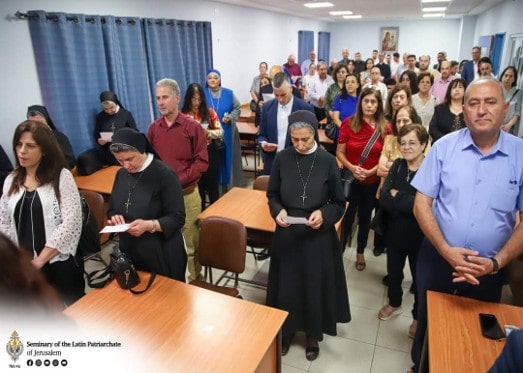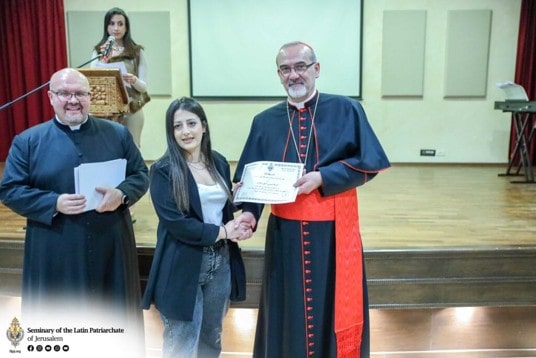Christians in the Holy Land are very proud of their heritage but often have only a shaky understanding of the basic tenets of the Faith. The current Catholic leadership wants to improve the situation and to bridge the gaps in their Christian knowledge by engaging in a robust spiritual formation programme thanks to ACN’s partnership with the LPJ.
George Akroush puts it bluntly: “We belong to a tribe which is Christians of the Middle East, but we have a shallow understanding of our faith and the minimal understanding of the Holy Land’s religious, historical and cultural significance to the first Church community in the world.”
The head of the Development Office in the Latin Patriarchate of Jerusalem is referring to the lack of spiritual and religious formation among a good deal of the Christians who continue to live in the Holy Land. “We have to put our finger in this wound, that we are weak in forming our people, especially being from the Holy Land,” he adds.
During a recent visit to the Holy Land by a delegation from the pontifical charity Aid to the Church in Need (ACN), local Catholic leaders shared various anecdotes to illustrate this problem, such as two Christian friends from Jerusalem who arranged to meet by Jesus’ tomb, in the Holy Sepulchre, and ended up in different places because one of them thought that the tomb was the stone slab where Jesus’ body was anointed, or Christians who have lived their whole lives in Galilee, but have never bothered to go to Jerusalem to visit the holy sites.
Father Bernard Poggi, rector of the Latin Seminary in Beit Jala, Bethlehem, recalls being stunned when speaking to a group of lay students about the Catholic understanding of salvation. “Their idea was more Protestant, or even Islamic. That it is enough to be a Christian, and you are saved. That you don’t contribute it, you just sit and wait. When they discovered the truth about how salvation works, it was very eye-opening.”
According to Fr Bernard this situation is general and even affects religious education teachers at schools. “Most of our Christian teaching staff are graduates from the Protestant Bethlehem Bible College,” he says, shaking his head. The Church realises, however, that in many cases the problem lies in the lack of good Catholic alternatives. Spiritual and religious formation has, therefore, become one of the main priorities of the Latin Patriarchate of Jerusalem, which is headed by Cardinal Patriarch Pierbattista Pizzaballa, and which oversees the entire Catholic Church of the Latin Rite in Israel and Palestine, as well as Jordan and Cyprus.
One visible aspect of this effort is the Spiritual Formation Center, which operates out of the Latin Seminary in Beit Jala, in classrooms which were recently refurbished and equipped through a project funded by ACN. Asal Sleibi, a Christian mother of three who oversees the many courses offered, explains that this is the first time in the history of the Church in the Holy Land that the laity were invited into the seminary to deepen their understanding of the faith.

“We began our first semester on September 2023 with four courses. Introduction to moral life, with 40 participants; the Old Testament, with 38 participants; Salvation History, 44 participants; and spiritual life, with 38 participants. Surprisingly, we had more women students than men,” Asal explains.
By the second semester, the number of students doubled, and since then they have continued to increase, despite the severe constraints caused by the war in Gaza, which started in October 2023, keeping some lecturers and students from being able to attend in person.
Speaking about the difference a solid formation in the Faith can make to Christians in times of difficulty, Fr Bernard recalls that towards the end of the same class where he enlightened his students about salvation, sirens began to wail. “One of our students went up to the roof to have a look and saw lights in the sky. The Iranian regime had launched hundreds of missiles. We decided to go, but before we did, I gave them all absolution. Then I noticed that one of the students was crying, and I asked if he was all right. He said: ‘I am fine, but my sister is very scared, and I can’t go to be with her. You just taught me about salvation, Father, but my sister doesn’t know!’”
Fr Bernard and Asal hope that the formation they are giving the laity will trickle down to the new generations and say there are already signs that is happening: “Our people are thirsty to know and live their faith. This can be a turning point in the history of Christian education in the Holy Land.”


